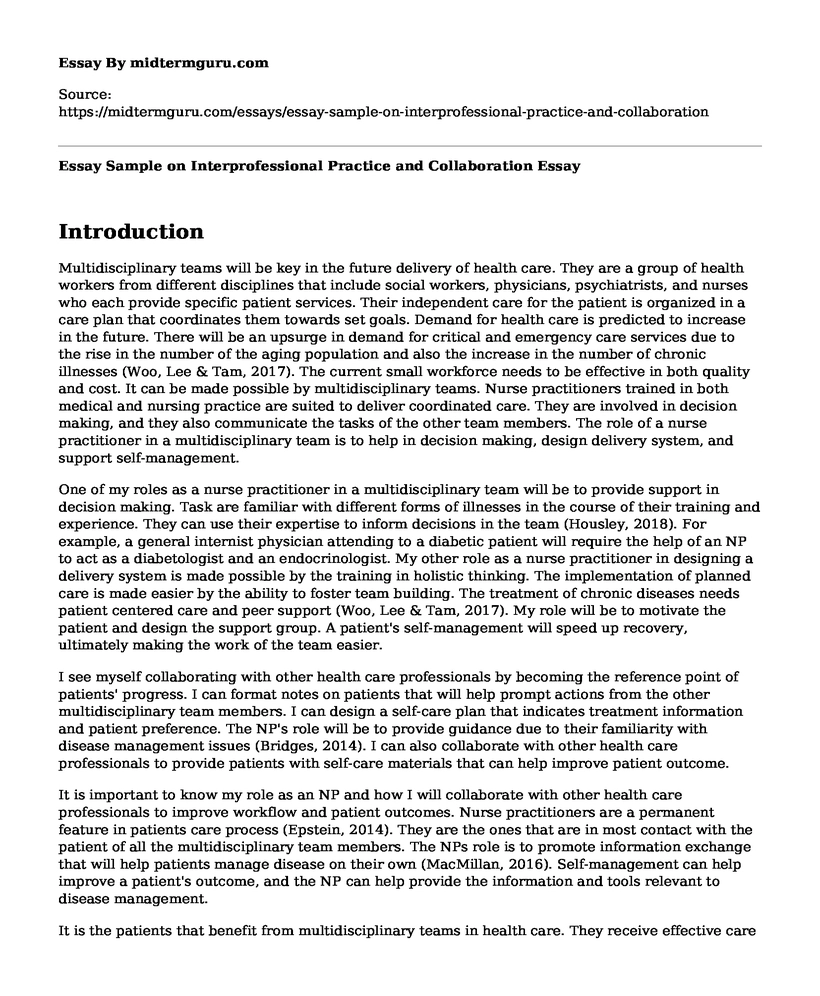Introduction
Multidisciplinary teams will be key in the future delivery of health care. They are a group of health workers from different disciplines that include social workers, physicians, psychiatrists, and nurses who each provide specific patient services. Their independent care for the patient is organized in a care plan that coordinates them towards set goals. Demand for health care is predicted to increase in the future. There will be an upsurge in demand for critical and emergency care services due to the rise in the number of the aging population and also the increase in the number of chronic illnesses (Woo, Lee & Tam, 2017). The current small workforce needs to be effective in both quality and cost. It can be made possible by multidisciplinary teams. Nurse practitioners trained in both medical and nursing practice are suited to deliver coordinated care. They are involved in decision making, and they also communicate the tasks of the other team members. The role of a nurse practitioner in a multidisciplinary team is to help in decision making, design delivery system, and support self-management.
One of my roles as a nurse practitioner in a multidisciplinary team will be to provide support in decision making. Task are familiar with different forms of illnesses in the course of their training and experience. They can use their expertise to inform decisions in the team (Housley, 2018). For example, a general internist physician attending to a diabetic patient will require the help of an NP to act as a diabetologist and an endocrinologist. My other role as a nurse practitioner in designing a delivery system is made possible by the training in holistic thinking. The implementation of planned care is made easier by the ability to foster team building. The treatment of chronic diseases needs patient centered care and peer support (Woo, Lee & Tam, 2017). My role will be to motivate the patient and design the support group. A patient's self-management will speed up recovery, ultimately making the work of the team easier.
I see myself collaborating with other health care professionals by becoming the reference point of patients' progress. I can format notes on patients that will help prompt actions from the other multidisciplinary team members. I can design a self-care plan that indicates treatment information and patient preference. The NP's role will be to provide guidance due to their familiarity with disease management issues (Bridges, 2014). I can also collaborate with other health care professionals to provide patients with self-care materials that can help improve patient outcome.
It is important to know my role as an NP and how I will collaborate with other health care professionals to improve workflow and patient outcomes. Nurse practitioners are a permanent feature in patients care process (Epstein, 2014). They are the ones that are in most contact with the patient of all the multidisciplinary team members. The NPs role is to promote information exchange that will help patients manage disease on their own (MacMillan, 2016). Self-management can help improve a patient's outcome, and the NP can help provide the information and tools relevant to disease management.
It is the patients that benefit from multidisciplinary teams in health care. They receive effective care due to the collaboration of multiple professionals. Psychological outcomes will improve due to the form of therapy designed by the NP. For example, group therapy, designed by the NP, can have patients that share the same chronic illness encourage each other through shared experiences (Bridges, 2014). The stakeholders are the multidisciplinary team members that are in control of patient care (Housley, 2018). Nurses, physicians, psychiatrists, social workers, and other hospital staff are invested in improving the health of their patients.
The NP spends most of the time with the patients of all the other multidisciplinary team members. This position enables NPs act as a bridge between the patient and the team. They design the delivery system, support self-management and they are also involved in decision making. It is important to know and understand the role of a nurse practitioner to provide quality and cost-effective health care. Patient outcomes will improve, and the workforce will work efficiently in the upsurge in demand for health care.
References
Bridges, S. (2014). Exploration of the concept of collaboration within the context of nurse practitioner-physician collaborative practice. Journal of the American Association of Nurse Practitioner, 26(7): 402-410.
Epstein, N. (2014). Multidisciplinary In-Hospital Teams Improve Patient Outcomes: A review. Surgical Neurology International. 5(7), 295-S303.
Housley, W. (2018). Interaction in multidisciplinary teams. New York: Routledge.
MacMillan, K., et al. (2016). A qualitative study of nurse practitioner promotion of interprofessional care across institutional settings: Perspectives from different healthcare professional. International Journal of Nursing Sciences, 3, (1), 3-1.
Woo, Y. B., Lee, J. X., & Tam, W. W. (2017). The impact of the advanced practice nursing role on quality of care, clinical outcomes, patient satisfaction, and cost in the emergency and critical care settings: a systematic review. Human Resources for Health. doi: [10.1186/s12960-017-0237-9.
Cite this page
Essay Sample on Interprofessional Practice and Collaboration. (2022, Nov 03). Retrieved from https://midtermguru.com/essays/essay-sample-on-interprofessional-practice-and-collaboration
If you are the original author of this essay and no longer wish to have it published on the midtermguru.com website, please click below to request its removal:
- Definition of a Non-Compete Agreement - Paper Example
- Essay Sample: Individual Differences Affect Behavior at Work
- Essay Sample on Performance Improvement and Professional Education
- Essay Sample on Employee Discrimination
- Closing the Wage Gap: Examining Inequality in Earnings - Research Paper
- Creating a Recruitment Plan for R.J. Reynolds Tobacco Company - Research Paper
- From Gambling to Tutoring: How I Learned to Take Responsibility - Essay Sample







